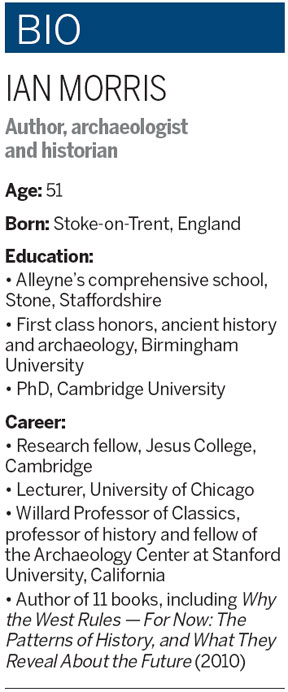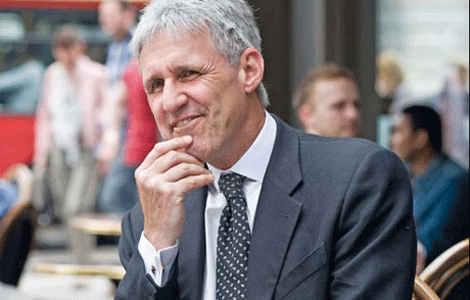Long-term view of history
Updated: 2011-09-09 08:34
By Andrew Moody (China Daily)
|
|||||||||
|
Ian Morris believes there is no such thing as racial difference making Easterners or Westerners pre-disposed toward dominance. Nick J B Moore / for China Daily |
Pace of technological change will make mockery of differences between East and West, says historian
Ian Morris seems too nice to be a harbinger of doom. As we sit at a pavement coffee bar, just off Piccadilly during the week of the London riots with police sirens sounding nearby, apocalyptic warnings don't seem too much out of context.
The Stanford University historian is the latest to weigh in on the debate as to whether the East is about to take over from the West with his book Why The West Rules - for Now.
He is confident China will take over from the United States as the richest economy in the world some time in the 21st century but that it might not matter that much because we might very soon all blow ourselves up anyway.
The powder keg, according to Morris, could be a combination of nuclear proliferation and global warming - as it is predicted to do - affecting a politically unstable Middle East worse than any other region.
"I actually do think that is a distinct possibility. I think you would have to be very optimistic to think that there won't be one state that thinks the best solution to their problems won't be to use nuclear weapons," he says.
He also thinks the big theme of his book, Western or Eastern dominance, will eventually also seem like a trivial issue since advances, particularly, in technology, will move the debate on.
"I think worrying about the relative strength of the East or the West will seem as peculiar by 2100 as Anglo-German naval rivalry seems now. That was a big deal, however, 100 years ago and was one of the things that tipped off the World War I but now, of course, it is laughable," he says.

Morris, who had just flown in overnight from Australia and was on his way to the Edinburgh Festival to talk about his book, is British, born in the industrial north Midlands city of Stoke-on-Trent but now living the life of a West Coast academic in the Santa Cruz mountains. He has been at Stanford for the past 16 years.
"It is different from Stoke anyway. One has redwood forests, the other abandoned collieries," he says laughing.
We attract attention from passers by as the photographer takes multiple shots and Morris does not hesitate giving money to a homeless man, himself a small indication perhaps of the decline of a once great power.
Morris actually begins the book with an alternative history, where Britain in the 19th century is actually colonized by China and Prince Albert, Queen Victoria's consort, finds himself kidnapped in the Forbidden City and growing a Manchu pigtail.
The reality, however, was that China lost two Opium Wars to Britain as a result of having lost any naval pre-eminence after the great Zheng He voyages of the 15th century.
This was the result of a national edict abandoning sea faring altogether and the country beginning a long period of isolation.
"These counterfactuals can get a bit silly. If the Chinese somehow leapfrogged on to 18th century ships, I suspect they would have done more or less the same thing in the Americas as the Europeans did," he says.
The main thrust of the book is looking at the question of Eastern and Western dominance over the very long term, going back some 15,000 years. One of Morris's specializations is archaeology.
"If you are not doing 15,000 years, you are not doing anything, I don't think," he says with a wry smile.
Morris wanted to challenge the idea that the West was dominant because it was the cradle of civilization following the emergence of ancient Greece and Rome, a view of history that ignores advances in China and what is now the Middle East at the same time.
"It is really a 250-year-old view that something happened about 2,500 years ago in Greece and Rome that made the West different from everywhere else despite all this other stuff going on around the world," he says.
One of his major contentions is that there is no such thing as racial difference making Easterners or Westerners pre-disposed toward dominance or superiority.
Why development has taken place as it has is largely due to geography and climate and their impact on agricultural development. People have always been the same, argues Morris.
"Some people have read what I have written and say how can I be so stupid. It is ridiculous to say they are all the same."
Morris argues the sort of humans who walked on earth 15,000 years ago are very much the same as people now.
"There are small differences. There might have been changes in (skin) pigmentation since then and there have been divergences across the world in resistance to different kinds of diseases but compared to Neanderthals or Heidelberg Man these differences are trivial," he says.
"Chinese homo sapiens 15,000 years ago are almost indistinguishable from the people walking around Beijing now."
Morris, the son of a coalminer who went on to teach mining engineering, was not necessarily destined to any academic stardom.
At comprehensive school he slightly underachieved but managed to get a first in history and archaeology at Birmingham University, which led to doing a PhD at Cambridge.
He followed an American girlfriend (now his wife) to the US, ended up teaching at Chicago University before arriving finally at Stanford.
"All I ever wanted to be in life was a heavy metal guitarist but I guess I grew up rather abruptly in my second or third year at university. I got a first class degree, which surprised everybody, certainly me."
The current book, which has been translated and published in China, came about because of the current focus on the rise of China with the obsession with extrapolating GDP growth rates and predicting when the Middle Kingdom will surpass the United States.
"The relative balance between the US and China will tip the same way it tipped between Europe and North America 100 years ago. While it is tipping Americans will still continue to get wealthier and wealthier," he says.
He argues - despite two world wars - there has been very little downside to Europe's supposed decline over the past century.
"Europeans now earn five times as much as they did 100 years ago and live 30 years longer. What it means to be human has changed more over this period than in the previous 30,000 years in terms of the advances there have been," he says.
He, however, says the pace of technological change - should we avoid nuclear annihilation - is only going to speed up, making a mockery of any differences between Eastern and Western societies.
"The stuff we do now would have seemed like magic 200 years ago. This magic-ness in 100 years is just going to be exponential," he says.
"At Stanford I am surrounded by geeks who confidently predict there is going to be some kind of fusion between us and machines - a joining of carbon-based and man-made silicon based intelligence. At that point things like Chinese-ness and Western-ness are just going to be meaningless," he says.
(China Daily 09/09/2011 page24)











